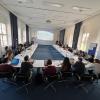
The Equity and Justice Research Group, in collaboration with the IIASA Strategic Initiative projects fairSTREAM, JustTRans4ALL and TRUST, hosted a Justice Framework Workshop on 16 November at IIASA.
The consideration of justice has become a critical area of focus for researchers worldwide, as awareness is increasing that (perceived) injustices are a main barrier for effectively tackling the global grand challenges, such as the climate crisis. As a leading international and interdisciplinary institute committed to supporting sustainable development policy and decision making, IIASA has made justice a central aspect of its current research strategy and strives to play a central role in this debate.
The Equity and Justice Research Group (EQU) at IIASA has been tasked with providing guidance to increase consistency and coherence in terms of addressing justice in sustainability research at IIASA and eventually beyond. To that end EQU hosted the workshop “Considering Justice in Applied Systems Analysis: Multiple Scales and Perspectives”, in collaboration with the Strategic Initiatives projects fairSTREAM, JustTrans4ALL and TRUST. More than 30 researchers and representatives of IIASA member organisations attended the workshop.
After a keynote from IIASA Acting Director Wolfgang Lutz and EQU Research Group Leader Thomas Schinko, the workshop provided an introduction to the Justice Framework developed by the EQU Research Group at IIASA since the kick-off workshop in 2021. Participants then had the opportunity to test the framework in five smaller break-out groups focusing on specifically relevant component or applications of it (see details below). The underlying aim of the workshop was to gather feedback from participants on how to further improve the framework and to determine how the framework can be applied to systems analysis at IIASA and beyond. The insights of this workshop will inform EQU's future research agenda in co-designing a conceptual framework that helps researchers increase reflecting on justice aspects in their work.
Each of the following five breakout sessions featured a short introduction, brief statements from session participants, and a discussion.
Methodological advances
Break-out Group 1: Justice applications for modeling work (Caroline Zimm)
This break-out used the EQU Justice Framework to integrate justice across the different steps of a research process. The group applied this to an example from integrated assessment modelling and discussed how this can be used in other IIASA research processes.
Break-out Group 2: Introducing diverse distributional justice patterns into integrated assessment models (Piotr Zebrowski)
Participants investigated how to represent and reconcile different justice patterns with the help of a model’s objective functions. The group explored how IIASA models can integrate this novel approach.
Breakout Group 3: Procedural justice in participatory research (Susanne Hanger-Kopp)
This break-out session reflected on aspects of procedural justice relevant to IIASA research. The group discussed how we design participatory processes and how we engage with stakeholders in our projects.
Policy field applications: Experiences from IIASA projects
Breakout Group 4: Introducing justice to biodiversity research (Christopher Wong)
This break-out group applied the EQU Justice Framework to the design of transformative biodiversity pathways in the Rainforest project. Participants explored how the Justice Framework can be applied to other biodiversity research at IIASA.
Break-out Group 5: Considering justice aspects in integrated disaster risk management (Teresa Deubelli-Hwang and Thomas Schinko)
Participants reflected on developing and applying the EQU Justice Framework in wildfire risk management in the FireLogue project. The group explored how to apply the Justice Framework to disaster risk management and climate adaptation research at IIASA.
IIASA Working Paper on the Justice Framework
Hanger-Kopp, S., Kikstra, J. , Mintz-Woo, K. , Scheifinger, K., Schinko, T. , Wallimann-Helmer, I., Wong, C., Woodhouse, E., & Zimm, C. (2024). IIASA/EQU Justice Framework: A descriptive guideline for science and policy. IIASA Working Paper. Laxenburg, Austria: WP-24-012
News

05 March 2025
Co-creating a stakeholder-oriented climate risk service in Austria

25 February 2025
Master Programme "Global Demography" at the University of Vienna

13 February 2025




